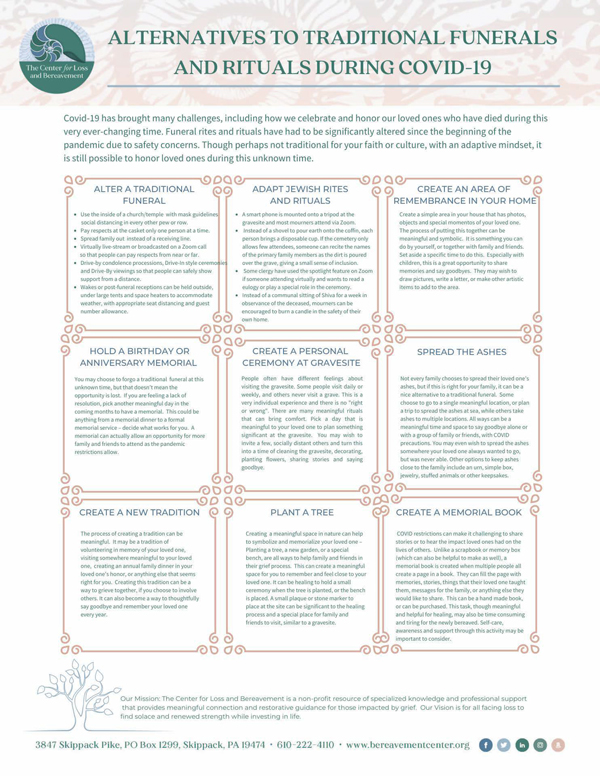CLB Tip Sheets
Alternatives to Traditional Funerals and Rituals During COVID-19
Covid-19 has brought many challenges, including how we celebrate and honor our loved ones who have died during this very ever-changing time. Funeral rites and rituals have had to be significantly altered since the beginning of the pandemic due to safety concerns. Though perhaps not traditional for your faith or culture, with an adaptive mindset, it is still possible to honor loved ones during this unknown time.
Alter a Traditional Funeral
- Use the inside of a church/temple with mask guidelines social distancing in every other pew or row.
- Pay respects at the casket only one person at a time.
- Spread family out instead of a receiving line.
- Virtually live-stream or broadcasted on a Zoom call so that people can pay respects from near or far.
- Drive-by condolence processions, Drive-In style ceremonies and Drive-By viewings so that people can safely show support from a distance.
- Wakes or post-funeral receptions can be held outside, under large tents and space heaters to accommodate weather, with appropriate seat distancing and guest number allowance.
Hold an Anniversary or Birthday Memorial
You may choose to forgo a traditional funeral at this unknown time, but that doesn’t mean the opportunity is lost. If you are feeling a lack of resolution, pick another meaningful day in the coming months to have a memorial. This could be anything from a memorial dinner to a formal memorial service – decide what works for you. A memorial can actually allow an opportunity for more family and friends to attend as the pandemic restrictions allow.
Create a New Tradition
The process of creating a tradition can be meaningful. It may be a tradition of volunteering in memory of your loved one, visiting somewhere meaningful to your loved one, creating an annual family dinner in your loved one’s honor, or anything else that seems right for you. Creating this tradition can be a way to grieve together, if you choose to involve others. It can also become a way to thoughtfully say goodbye and remember your loved one every year.
Adapt Jewish Rites and Rituals
- A smart phone is mounted onto a tripod at the gravesite and most mourners attend via Zoom.
- Instead of a shovel to pour earth onto the coffin, each person brings a disposable cup. If the cemetery only allows few attendees, someone can recite the names of the primary family members as the dirt is poured over the grave, giving a small sense of inclusion.
- Some clergy have used the spotlight feature on Zoom if someone attending virtually and wants to read a eulogy or play a special role in the ceremony.
- Instead of a communal sitting or Shiva for a week in observance of the deceased, mourners can be encouraged to burn a candle in the safety of their own home.
Create a Personal Ceremony at Gravesite
People often have different feelings about visiting the gravesite. Some people visit daily or weekly, and others never visit a grave. This is a very individual experience and there is no “right or wrong”. There are many meaningful rituals that can bring comfort. Pick a day that is meaningful to your loved one to plan something significant at the gravesite. You may wish to invite a few, socially distant others and turn this into a time of cleaning the gravesite, decorating, planting flowers, sharing stories and saying goodbye.
Plant a Tree
Creating a meaningful space in nature can help to symbolize and memorialize your loved one – Planting a tree, a new garden, or a special bench, are all ways to help family and friends in their grief process. This can create a meaningful space for you to remember and feel close to your loved one. It can be healing to hold a small ceremony when the tree is planted, or tile bench is placed. A small plaque or stone marker to place at the site can be significant to the healing process, and a special place for family and friends to visit, similar to a gravesite.
Create an Area of Remembrance in Your Home
Create a simple area in your house that has photos, objects and special momentos of your loved one. The process of putting this together can be meaningful and symbolic. It is something you can do by yourself, or together with family and friends. Set aside a specific time to do this. Especially with children, this is a great opportunity to share memories and say goodbyes. They may wish to draw pictures, write a letter, or make other artistic items to add to the area.
Spread the Ashes
Not every family chooses to spread their loved one’s ashes, but if this is right for your family, it can be a nice alternative to a traditional funeral. Some choose to go to a single meaningful location, or plan a trip to spread the ashes at sea, while others take ashes to multiple locations. All ways can be a meaningful time and space to say goodbye alone or with a group of family or friends, with COVID precautions. You may even wish to spread the ashes somewhere your loved one always wanted to go, but was never able. Other options to keep ashes close to the family include an urn, simple box, jewelry, stuffed animals or other keepsakes.
Create a Memorial Book
COVID restrictions can make it challenging to share stories or to hear the impact loved ones had on the lives of others. Unlike a scrapbook or memory box (which can also be helpful to make as well), a memorial book is created when multiple people all create a page in a book. They can fill the page with memories, stories, things that their loved one taught them, messages for the family, or anything else they would like to share. This can be a hand made book, or can be purchased. This task, though meaningful and helpful for healing, may also be time consuming and tiring for the newly bereaved. Self-care, awareness and support through this activity may be important to consider.
Join Our
Mailing List
Donate
Today
Request
Information

Affiliations
• NACG
• CBEM Changemaker
• ADEC
• Charity Navigator
Quick Links
About Us
Individual & Family Grief Counseling
Volunteer
News
Grief Support Resources
Contact
Ph: 610-222-4110
Fax: 610-222-4116
3847 Skippack Pike
P.O. Box 1299
Skippack, PA 19474
Support The Center For
Loss and Bereavement
